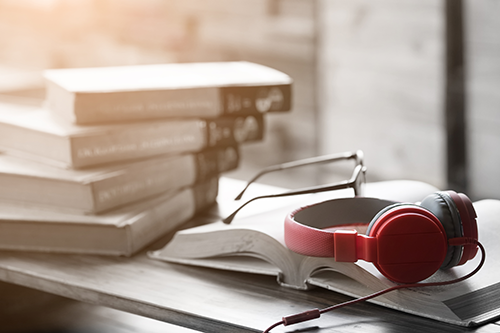
When it comes to listening to music while studying, there are two types of people—those who like background music and those who prefer silence. Which one are you? If you prefer peace and quiet, you might be missing out on the extra boost music can give your brain when learning new information.
The Scientific Support
for Musical Study Sessions
In a Northcentral University study, professor Dr. Masha Godkin concluded, “Music has the potential to take a person from the Beta brainwave state to deeper Alpha, and then Theta brainwave states, depending on the music...
Music activates both the left and right brain at the same time, and the activation of both hemispheres can maximize learning and improve memory.” Interested in better learning ability and retention? Read on!
For over 30 years from the 1960s to the 1990s, Bulgarian psychiatrist Dr. Georgi Lozanov studied music’s effect on the brain. He found that music can make your brain more receptive to learning, and further, that certain styles of music are better than others at improving your brain’s receptivity to information. He based his findings on a series of experiments that tested a person’s ability to recall new information learned while listening to various genres of music.
Dr. Lozanov found that instrumental classical music helps people learn faster and retain more information than studying in silence or listening to any other style of music. He also proved with MRI and PET scans that the brain reacted differently to different tempos and styles of classical music. In other words, you can maximize your study efforts by listening to music best suited to your study tasks.
Strategically Using Music While Studying
Based on Dr. Lozanov’s conclusions, there are three stages of effective learning—relaxation, active learning, and memory consolidation—and music that optimizes efficiency during each stage. To prepare your brain for learning, begin by listening to relaxing music. It will help you start your session feeling calm, positive, and ready to learn. Listening to calming music has been proven to have a profound effect on your mood, blood pressure, and heart rate. So, this will ensure your brain is starting off in its most receptive state.
When you study information for the first time, you are engaged in the active learning stage. During this stage, listen to bold, active, and expressive classical pieces to help you absorb the information you are studying. The upbeat music will help your brain develop retrieval cues tied to the new material.
Lozanov’s third stage is memory consolidation. When you review the information you’ve studied, listen to more passive pieces with a tempo of around 60–70 beats per minute. Slow, melodic music helps your brain encode information into long-term memory. Listening to passive music while you review will also create a new set of retrieval cues in your brain. The more cues your brain creates, the more easily you will recall information during an exam or in practice.
To save you time, we’ve created the perfect playlist for you to listen to next time you study. Simply click the link below to begin listening.
https://soundcloud.com/medstudy/sets/study-playlist/s-3U7Sh
Relaxation
Chopin—“Raindrop” Prelude No. 15
Active Learning
Mozart—Serenade No. 7 in D major
Beethoven—String Quartet No. 14 in C-sharp minor, Op. 131
Beethoven—Symphony No. 6 in F major, Op. 68 “Pastorale”
Mahler—Piano Quartet in A minor
Beethoven—Violin Concerto in D major, Op. 61
Memory Consolidation
Glass—Metamorphosis
Chopin—Nocturne in C-sharp minor
Satie—Gnossienne No. 1, Lent
Chopin—Nocturne in F minor, Op. 55
Stravinsky—Firebird Suite Lullaby
Satie—Trois Gymnopedies
Mix and match songs to find what works best for you, or create your own playlist based on Lozonov’s research. Listening to music while you study will not only help you study more efficiently, it will also help you remember what you studied when you need it most.


